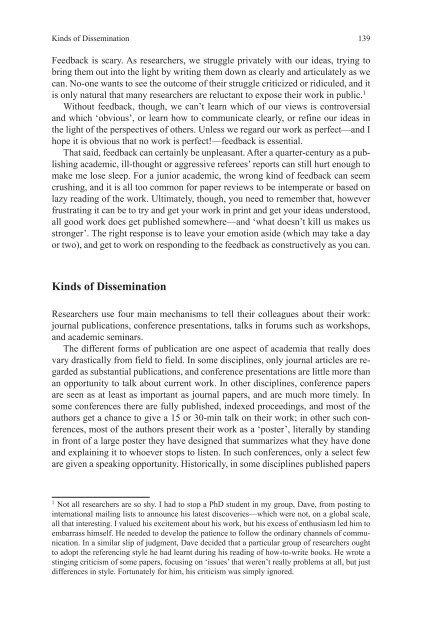How-to-Write-a-Better-Thesis
You also want an ePaper? Increase the reach of your titles
YUMPU automatically turns print PDFs into web optimized ePapers that Google loves.
Kinds of Dissemination <br />
139<br />
Feedback is scary. As researchers, we struggle privately with our ideas, trying <strong>to</strong><br />
bring them out in<strong>to</strong> the light by writing them down as clearly and articulately as we<br />
can. No-one wants <strong>to</strong> see the outcome of their struggle criticized or ridiculed, and it<br />
is only natural that many researchers are reluctant <strong>to</strong> expose their work in public. 1<br />
Without feedback, though, we can’t learn which of our views is controversial<br />
and which ‘obvious’, or learn how <strong>to</strong> communicate clearly, or refine our ideas in<br />
the light of the perspectives of others. Unless we regard our work as perfect—and I<br />
hope it is obvious that no work is perfect!—feedback is essential.<br />
That said, feedback can certainly be unpleasant. After a quarter-century as a publishing<br />
academic, ill-thought or aggressive referees’ reports can still hurt enough <strong>to</strong><br />
make me lose sleep. For a junior academic, the wrong kind of feedback can seem<br />
crushing, and it is all <strong>to</strong>o common for paper reviews <strong>to</strong> be intemperate or based on<br />
lazy reading of the work. Ultimately, though, you need <strong>to</strong> remember that, however<br />
frustrating it can be <strong>to</strong> try and get your work in print and get your ideas unders<strong>to</strong>od,<br />
all good work does get published somewhere—and ‘what doesn’t kill us makes us<br />
stronger’. The right response is <strong>to</strong> leave your emotion aside (which may take a day<br />
or two), and get <strong>to</strong> work on responding <strong>to</strong> the feedback as constructively as you can.<br />
Kinds of Dissemination<br />
Researchers use four main mechanisms <strong>to</strong> tell their colleagues about their work:<br />
journal publications, conference presentations, talks in forums such as workshops,<br />
and academic seminars.<br />
The different forms of publication are one aspect of academia that really does<br />
vary drastically from field <strong>to</strong> field. In some disciplines, only journal articles are regarded<br />
as substantial publications, and conference presentations are little more than<br />
an opportunity <strong>to</strong> talk about current work. In other disciplines, conference papers<br />
are seen as at least as important as journal papers, and are much more timely. In<br />
some conferences there are fully published, indexed proceedings, and most of the<br />
authors get a chance <strong>to</strong> give a 15 or 30-min talk on their work; in other such conferences,<br />
most of the authors present their work as a ‘poster’, literally by standing<br />
in front of a large poster they have designed that summarizes what they have done<br />
and explaining it <strong>to</strong> whoever s<strong>to</strong>ps <strong>to</strong> listen. In such conferences, only a select few<br />
are given a speaking opportunity. His<strong>to</strong>rically, in some disciplines published papers<br />
1<br />
Not all researchers are so shy. I had <strong>to</strong> s<strong>to</strong>p a PhD student in my group, Dave, from posting <strong>to</strong><br />
international mailing lists <strong>to</strong> announce his latest discoveries—which were not, on a global scale,<br />
all that interesting. I valued his excitement about his work, but his excess of enthusiasm led him <strong>to</strong><br />
embarrass himself. He needed <strong>to</strong> develop the patience <strong>to</strong> follow the ordinary channels of communication.<br />
In a similar slip of judgment, Dave decided that a particular group of researchers ought<br />
<strong>to</strong> adopt the referencing style he had learnt during his reading of how-<strong>to</strong>-write books. He wrote a<br />
stinging criticism of some papers, focusing on ‘issues’ that weren’t really problems at all, but just<br />
differences in style. Fortunately for him, his criticism was simply ignored.














![[Lonely Planet] Sri Lanka](https://img.yumpu.com/59845622/1/169x260/lonely-planet-sri-lanka.jpg?quality=85)


